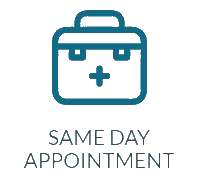When should I get a colonoscopy?

You’ve probably heard of a colonoscopy before, but you may not know what the procedure is or if you’ll ever need one in the future. If you’re in good overall health and haven’t suffered from gastrointestinal problems, there’s little chance you’ve undergone this screening. However, if you’re nearing 50, now’s the time to learn about this important test and why you should consider making it a part of your preventative health screenings.
What Is a Colonoscopy?
Colonoscopies are screening tests that examine the large intestine for polyps and other abnormalities that indicate the presence of colorectal cancer. This cancer appears in the colon or rectum, which together make up the large intestine. According to the American Cancer Society, colorectal cancer accounts for the third highest mortality rate of all cancers for women and men, claiming 50,260 lives from the disease in 2017. About 135,400 people were diagnosed with colorectal cancer that same year. Luckily, if caught early, this form of cancer can be cured 90 percent of the time. Colonoscopies are the best single tool doctors have to screen for colorectal cancer and other disorders of the lower gastrointestinal tract.
How Is a Colonoscopy Performed?
On the day of the test, you’ll be given twilight sedation so that you won’t feel any pain during the screening. Most patients don’t even remember the exam afterward. During the colonoscopy, your doctor will:
- Insert a colonoscope (a hollow, flexible tube with a light on the end) into your colon.
- Move the colonoscope inside the colon and capture pictures of the entire colon, which is approximately three to four feet long.
- Inspect the colon for polyps (growths) that could be cancerous in addition to checking for signs of gastrointestinal disorders such as bleeding, diverticulosis, inflammatory bowel disease, and more.
- Remove any polyps as necessary during the exam.
A major hurdle preventing many people from getting a recommended colonoscopy is the necessary “bowel prep.” The colon must be as clean as possible for any abnormalities to be visible, so your doctor will prescribe you one or more varieties of laxatives the day before the procedure to completely clear your system. Although the bowel prep process can be difficult and uncomfortable, it is vital to the accuracy of the screening and worth the hassle to ensure you are cancer free.
Why Should I Get a Colonoscopy?
If you’re 50 or older, your doctor will recommend you get a screening since colorectal cancer begins to appear more frequently around this age. You may consider having the procedure earlier if you have any of the following risk factors:
- You have a family member (parent, sibling, or child) who’s been diagnosed with colorectal cancer.
- You’re African-American. Colorectal cancer rates are higher for this group.
- You’ve been diagnosed with Crohn’s disease, inflammatory bowel disease (IBD), or ulcerative colitis.
If you are suffering from the following acute symptoms, your doctor may suggest a screening:
- Persistent abdominal cramps and gas
- Blood in the stool
- Persistent diarrhea or constipation
Fortunately, if your colonoscopy results are normal, you won’t need another screening for 10 years. If your doctor removes any polyps, you’ll probably be advised to undergo colonoscopies every three to five years.
If you’re ready to schedule your first colonoscopy, contact us today for a consultation with one of the gastroenterologists at Park Avenue Medical Professionals in Manhattan. Not only do we perform this vital screening, we specialize in the diagnosis and treatment of all disorders of the GI tract in addition to liver disease, cardiology, sports and musculoskeletal medicine, general medicine, and urgent care. Fill out the form on this page to request an appointment or call 212.427.2000 to learn more.



